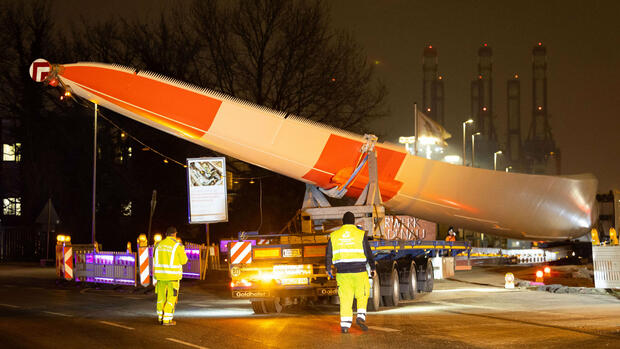It currently takes weeks before a special transport with excess length, width or weight is approved.
(Photo: dpa)
Berlin The transporters and logisticians could not believe their ears. 15,000 applications for large-volume or heavy-duty transports are currently unprocessed at the Autobahngesellschaft für Nordwestdeutschland.
Worse still, no more applications would be accepted until July due to IT problems. The applications continue to pile up for so long, as the perplexed entrepreneurs had to learn directly from employees of the Autobahn branch office Northwest at an event in Hanover a good two weeks ago. Several participants report this to the Handelsblatt.
Regardless of whether wind turbines, heavy equipment for a construction site or machines for export via German seaports have to find their way north: Anyone who submits an application these days will only receive an automatic e-mail from the Autobahngesellschaft Nordwest: Because of the “currently increased application volume” would be processed “applications exclusively by date”. “As soon as the situation calms down again, we will be happy to make the general service available to you again via this mailbox.” The Handelsblatt has received such news.
>> Read here: Frustration among employees of Autobahn GmbH
The export nation Germany is currently no longer reaching some of its seaports, at least not when the goods are particularly large and things have to be done quickly. It currently takes eight weeks for a special transport that is too long, too wide or too heavy to be approved. Carriers are already considering going to ports in Belgium, the Netherlands or Italy. “This is how you destroy the economy with your eyes wide open,” complains one of them.
In the meantime, the problems have also reached Transport Minister Volker Wissing (FDP). His parliamentary state secretary and chairman of the supervisory board of the Autobahngesellschaft, Oliver Luksic (FDP), invited those affected to the crisis talks.
In view of the chaotic conditions at the beginning of the year, 29 associations had come together in an alliance “to maintain the future viability of Germany as a business location”, as the self-description says. The associations include, for example, the Federal Association of German Industry and the industry associations of the construction industry, steel construction or mechanical and plant engineering.
Its members have suffered from numerous hurdles since the start of the Autobahngesellschaft 2021. The new central administration lacks staff, there is a lack of expertise and there are problems with the IT systems. And there are regional differences: while things are going “very well” in the Bavarian branch, the further north you apply, the transporters report that things get worse and worse. The delays and problems would “hinder important infrastructure and energy projects,” said a spokeswoman for the German Construction Industry Association.
Transporters find it difficult to reach the Rahmedetal Bridge
The dramatic situation even affects the Rahmedetal bridge on the A45 near Lüdenscheid, which Minister Wissing declared a top priority: the 70-meter-high bridge has been closed since December 2021 and was finally blown up on Sunday.
Although the minister has been there several times, the special transports for the construction equipment did not make it there – because the motorway company cannot even approve its own construction sites quickly.
Entrepreneurs wanted to use the remaining sections of the motorway because the bypass roads are not designed for transports weighing 140 tons and four meters wide. “We hardly managed to get transports there on time because the motorway company wasn’t ready,” reports one person affected. The new building should shine as a model for the other 4,000 bridges in need of renovation on German autobahns.
>> Read here: How Autobahn GmbH disrupted supply chains because of five centimeters
The transport companies also complain about “excessive requirements” when it comes to transport: Sometimes they are only allowed to drive five kilometers per hour on the motorway, then they need an enormous number of escort vehicles. The costs quickly increase by several thousand euros per trip.
The association wants to call for fundamental reforms this Monday. According to information from the Handelsblatt, this includes digitally identifying corridors for large-volume and heavy-duty transports nationwide.
In addition, the “increasingly dilapidated transport infrastructure” is to be repaired immediately and, if necessary, expanded. As in the future with the rail network, so-called “high-performance corridors” for freight traffic are also to be created on the road and waterways.
Standards for Approval Processes
The approval procedures are also to be standardized and thus become simpler and faster. There has been a digital registration tool for 15 years. However, this is still considered “not mature”, as the Federal Association of Heavy Transport and Crane Works criticizes. This includes receiving an approved application digitally and then being able to drive with a sat nav instead of a passenger.
Representatives of the highway company will also attend the meeting at the ministry. They can at least report a small ray of hope: The Northeast branch was able to reduce its application backlog from 6,000 open applications in December to 1,800 in April. An open dialogue with business and, above all, more staff would have helped, as the industry said.
More: “Either/or policy is the wrong way” – associations are looking for a middle ground in transport policy
